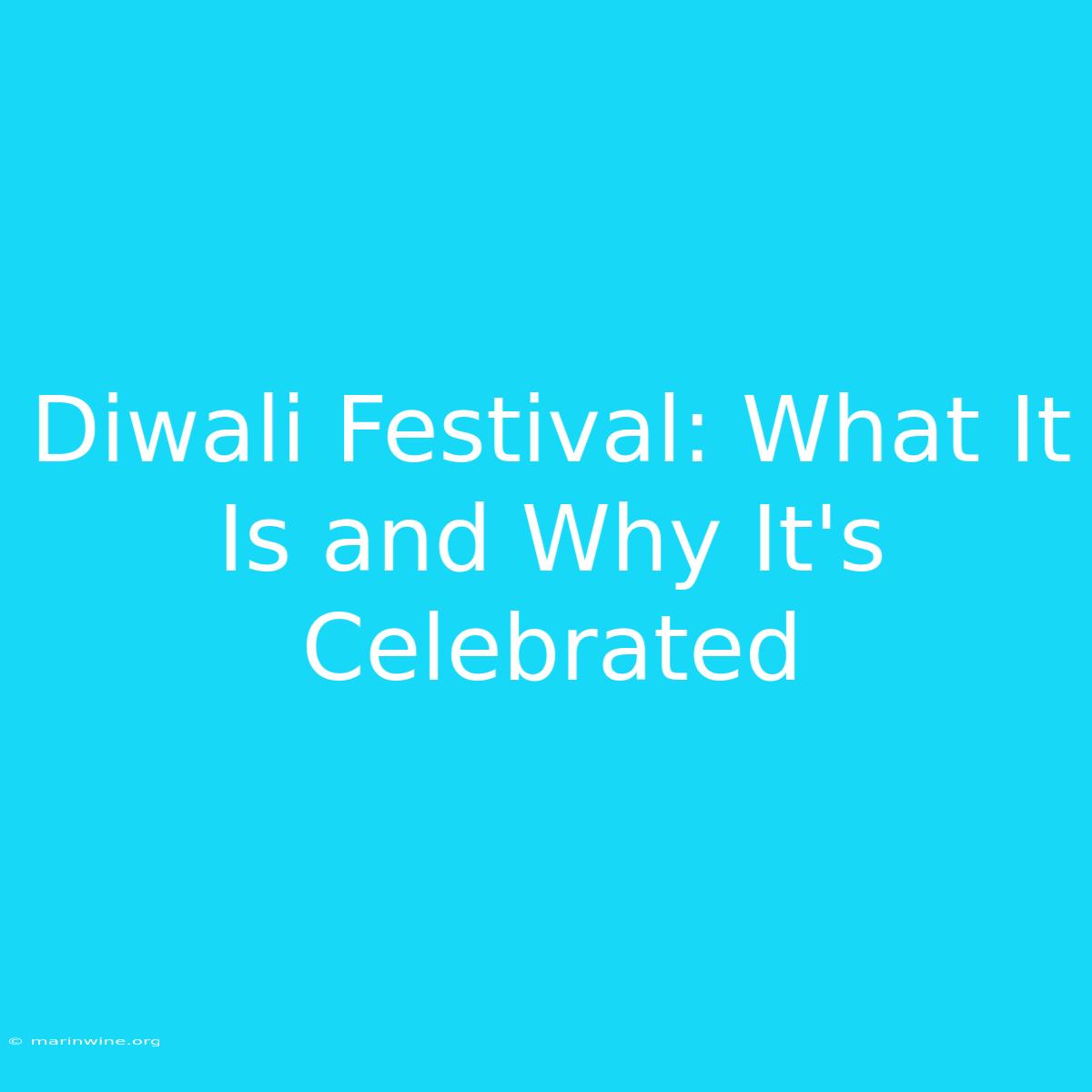Diwali Festival: What It Is and Why It's Celebrated
Have you ever wondered why Diwali is celebrated with such vibrant joy and light? This festival of lights is much more than just colorful decorations and fireworks. It's a celebration of hope, prosperity, and the triumph of good over evil, deeply rooted in Indian culture and heritage.
Why It Matters: Diwali, also known as Deepavali, is one of the most significant festivals in India and is celebrated by millions across the globe. Understanding the origins and traditions behind Diwali provides a deeper appreciation for this festive occasion and its profound cultural significance.
Key Takeaways of Diwali:
| Takeaway | Description |
|---|---|
| Festival of Lights | Diwali signifies the victory of light over darkness, knowledge over ignorance, and good over evil. |
| Celebration of Prosperity | Diwali marks the beginning of a new financial year and is associated with wealth and abundance. |
| Honoring Goddess Lakshmi | Goddess Lakshmi, the deity of wealth and prosperity, is worshipped during Diwali. |
| Family and Community | Diwali is a time for family reunions, community gatherings, and sharing joy with loved ones. |
Diwali Festival: A Journey Through Time and Traditions
Diwali's origins can be traced back to ancient India, with stories woven into its tapestry of celebration. The festival is linked to several myths and legends, all emphasizing the triumph of light over darkness.
The Return of Lord Rama
One of the most popular stories associated with Diwali is the return of Lord Rama, the protagonist of the epic Ramayana, to Ayodhya after defeating the demon king Ravana. The people of Ayodhya lit diyas (oil lamps) to welcome him back and celebrate his victory, symbolizing the triumph of good over evil.
The Story of Narakasura
Another popular story recounts the slaying of the demon king Narakasura by Lord Krishna. This victory also symbolizes the triumph of good over evil and is celebrated on the eve of Diwali, known as Naraka Chaturdashi.
The Significance of Light
Diwali is a festival of light for many reasons. Diyas represent the victory of light over darkness, knowledge over ignorance, and hope over despair. The festival is a time to illuminate our homes and lives, casting away negativity and embracing positivity.
The Role of Lakshmi
Goddess Lakshmi, the embodiment of wealth, prosperity, and good fortune, is deeply associated with Diwali. People worship Lakshmi during the festival, seeking her blessings for abundance and success. The festival marks the beginning of the new Hindu financial year, signifying a fresh start and a time to attract wealth.
The Essence of Togetherness
Beyond the religious aspects, Diwali is a time for family and community. People gather to celebrate, share gifts, and enjoy delicious meals. It is a time to strengthen bonds, spread joy, and create lasting memories.
Diwali: Beyond the Festivities
Diwali's essence transcends the celebratory festivities. It reminds us to fight against negativity, embrace the light within ourselves, and cultivate hope and prosperity. The festival encourages us to create a brighter future for ourselves and our communities.
FAQ for Diwali Festival:
| Question | Answer |
|---|---|
| When is Diwali celebrated? | Diwali is celebrated on the 15th day of the Kartik month (October/November) according to the Hindu lunisolar calendar. |
| What is the significance of diyas? | Diyas represent the victory of light over darkness, knowledge over ignorance, and hope over despair. |
| What are some of the traditions associated with Diwali? | Some traditions include lighting diyas, bursting fireworks, offering prayers to Goddess Lakshmi, sharing sweets, and enjoying family gatherings. |
| What is the significance of the fireworks? | Fireworks symbolize the celebration and joy of the festival. |
| How is Diwali celebrated in different parts of India? | Diwali is celebrated in different ways across India, reflecting the diversity of regional cultures and traditions. |
| What are some of the foods associated with Diwali? | Diwali is associated with a variety of delicious sweets and savory dishes, such as laddoos, gulab jamun, samosas, and jalebis. |
Tips for Celebrating Diwali:
- Light Up Your Home: Decorate your home with diyas, candles, and fairy lights to create a festive atmosphere.
- Offer Prayers to Goddess Lakshmi: Perform puja (worship) to Goddess Lakshmi for prosperity and good fortune.
- Share Gifts with Loved Ones: Exchange gifts with family and friends to spread joy and celebrate togetherness.
- Enjoy Delicious Sweets and Savory Dishes: Indulge in the delicious traditional sweets and savory dishes associated with Diwali.
- Embrace the Spirit of Diwali: Spread kindness and positivity, and celebrate the triumph of good over evil.
Summary of Diwali Festival
Diwali is a vibrant and multifaceted festival deeply rooted in Indian culture. The celebration of light, prosperity, and good over evil is a reminder to embrace hope, positivity, and the importance of family and community. The festival embodies the timeless values of Indian tradition, offering a powerful message of resilience, faith, and the pursuit of a brighter future.
Closing Message: This Diwali, let us all illuminate our lives with the light of hope, kindness, and generosity. May the festival bring happiness, prosperity, and blessings to everyone.

